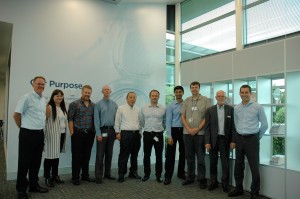2016 Lean Masterclass
Lean programmes rewarded with effort
 Firms throughout New Zealand continue to seek efficiency improvements through Lean Thinking, but studies have shown that many such efforts will fall short.
Firms throughout New Zealand continue to seek efficiency improvements through Lean Thinking, but studies have shown that many such efforts will fall short.
That failure will have nothing to do with the validity of Lean Thinking as a concept. Since the 1980s, the founder of these principles, Japanese automaker Toyota, has led its industry. This ongoing success is achieved by focusing on continuous improvement through waste reduction, constant attention to lowering costs, and in adding value for customers. Rather than reflecting a deficiency in the principles, many companies will try to incorporate Lean without first having the necessary ingredients in place.
Hoping to avoid wasting their Lean efforts, business leaders throughout the country recently convened to hear the teachings of Akinori Hyodo, president of a Toyota Group Training Facility and former manager of one of Toyota’s top manufacturing plants.
Firms must establish a system that promotes change awareness, said Hyodo, who was brought to Auckland by business consultants Simply Lean Business Solutions to lead a two-day seminar on Lean Thinking at the Manukau Institute of Technology. The findings were that management and employees both must embrace change, but it is management’s responsibility to lead and advance that change. A visit to Fisher & Paykel Healthcare’s plant in Auckland provided an opportunity to see this in practice.
A company’s leaders must be visionary, and their teams must not only understand that vision, but also adopt a way of thinking that is focused on identifying areas for improvement on a continuous basis, Hyodo explained.
For businesses looking to improve, Lean Thinking can sound attractive on paper but can become overwhelming and abstract in practice. Peter Cox, Simply Lean’s director, said Hyodo’s no-nonsense, engaging, and inspirational teaching was a big reason he was brought to New Zealand for the seminar through our association with Shinka Management.
Cox, who has 20 years of experience in senior management roles within Toyota, said he knew Hyodo Sensei would reinforce the role of leadership and the responsibility to grow a company’s people. Cox wanted participants to come away with an understanding of how to translate the theory into simple, practical steps to advance their Lean journey.
“Organisations trying to embrace the different elements of Lean often complicate things unnecessarily and get lost in the theory instead of getting on with it,” Cox said.
Seminar attendee Stephen de Kriek, CEO of Auckland-based Best Bars Limited, agreed. “The biggest takeaway is the practical delivery of the course and how we can apply this back into our organization,” noted de Kriek, whose company sells towing solutions and auto accessories. “What our management team has learnt here is how to deliver the message back into our business in a practical way, particularly at the supervisor and operator level.”
NK Window Solutions Limited, a Christchurch-based window and door systems retailer, is another company whose representative was inspired by Hyodo’s workshop. The company’s director, Prue Chapman, said she loved Sensei’s message that management must respect workers and provide leadership that is educational and nurturing. “As leaders we need to be patient, and recognize that people are people! We need to be consistent, supportive and repetitive to coach them through processes,” Chapman said.
Indeed, strong communication and interaction between front-line employees and management is key to the success of Lean practises. After all, continuous improvement can only happen if employees are empowered to communicate problems and ideas, and feel their voice will be heard and given serious consideration.
Although the concept of continuous improvement seems easy to understand, implementing it requires careful planning, thinking, and action, Cox said. Instantaneous results cannot always be expected because leaders are progressively changing their team’s practices and behaviours, which takes time. Leaders must challenge their people and be disciplined, persistent, and repetitive in their coaching.
Despite these considerations, Hyodo asserted that the actual challenges and problems faced by companies across business sectors are remarkably similar, even though they manifest themselves in different ways. If a Lean system is properly implemented, Hyodo concludes from his own experience that the rewards and benefits are well worth the effort in terms of personal development, productivity, and profitability.
Akinori Hyodo is a former factory manager at one of Toyota’s HiAce vehicle manufacturing plants in Japan, which is consistently ranked No.1 for quality within the Toyota group. Hyodo Sensei has devoted much of his career to leading and implementing the Toyota Production System, is a 13-year member and leader of the All-Toyota Kaizen Promotion team and is now President of the Toyota Group Training facility associated with his former factory.
“Bringing this knowledge to companies to help them improve their business activities and employee engagement is very important to our team here at Simply Lean. Along with our consulting services this drive is also supported through our Lean Japan Tours which we have undertaken for the last eight years, in collaboration with Shinka Management.
- Posted in:
- Event Reports
- News
